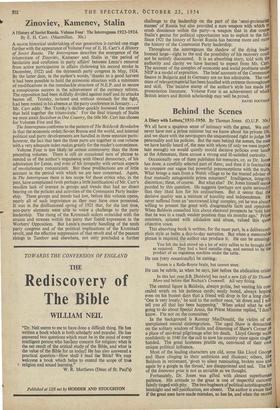Zinoviev, Kamenev, Stalin
A History of Soviet Russia. Volume Four: The Interregnum 1923-1924. By E. H. Carr. (Macmillan. 30s.) A MAJOR historical undertaking of our generation is carried one stage further with the appearance of Volume Four of E. H. Carr's A History of Soviet Russia. The Interregnum describes the emergence of the triumvirate of Zinoviev, Kamenev and Stalin in 'the period of hesitation and confusion in party affairs' between Lenin's removal from active participation in affairs (following his second stroke in December, 1922) and the thirteenth party congress in May, 1924. By the latter date, in the author's words, 'thanks to a good harvest it had been possible to hold the economic situation with a minimum of modifications in the ramshackle structure of N.E.P. and to secure a conspicuous success in the achievement of the currency reform. The opposition had been skilfully divided against itself and its attacks beaten off. Trotsky, isolated and without stomach for the fight, had been routed in his absence at the party conference in January... Mr. Carr adds: 'But Trotsky's decline quickly loosened the cement that held together the triumvirate.' For the final triumph of Stalin we must await Socialism in One Country, the title Mr. Carr has chosen for Volumes Five and Six.
The Interregnum conforms to the pattern of The Bolshevik Revolution in that the economic order, Soviet Russia and the world, and internal political and party developments are handled in three separate parts: however, the fact that here the three parts are together in one volume with a very adequate index makes greatly for the reader's convenience.
Volume Four is less likely to arouse controversy than the three preceding volumes. There is still an occasional turn of phrase to remind us of the author's impatience with liberal democracy, of his admiration for Lenin, and even of his sympathy with certain aspects of revolutionary romanticism. But these predilections are of little account in the period with which we are here concerned. Again, in The Interregnum there is less scope for those critics who, in the past, have complained (with perhaps a little justification) of Mr. Carr's resolute lack of interest in groups and trends that had no direct bearing on the policies and activities of the Communist Party leader- ship. These groups and trends had lost, before this volume opens, nearly all of such importance as they may have once possessed. It was in the disillusioned spring of 1921 that, for the last time, non-party elements were able to voice a challenge to the party leadership. The rising of the Kronstadt sailors coincided with the strains and stresses within the party that found expression in the Workers' Opposition. But Lenin's masterly handling of the tenth party congress and of the political implications of the Kronstadt revolt, and the effective suppression of that revolt and of the peasant risings in Tambov and elsewhere, not only precluded a further challenge to the leadership on the part of the 'semi-proletarld$ masses' of Russia but also provided a sure weapon with which td crush dissidence within the party—a weapon that in due course Stalin's genius for political opportunism was to exploit to the full. Since 1921 the history of Soviet Russia has become more and more the history of the Communist Party leadership.
Throughout the interregnum the shadow of the dying leader loomed large—right to the end the possibility of his recovery could not be entirely discounted. It is an absorbing story, told with the authority and clarity we have learned to expect from Mr. Carr. The account of the complex of economic and social problems uncle, NEP is a model of exposition. The brief accounts of the Communist fiascos in Bulgaria and in Germany are no less admirable. The vast mass of relevant material has been handled with extreme thoroughness and skill. The incisive stamp of the author's style has made hit presentation literature. Volume Four is an achievement of which British letters and British scholarship may well be.proud. DAVID roartall


































 Previous page
Previous page